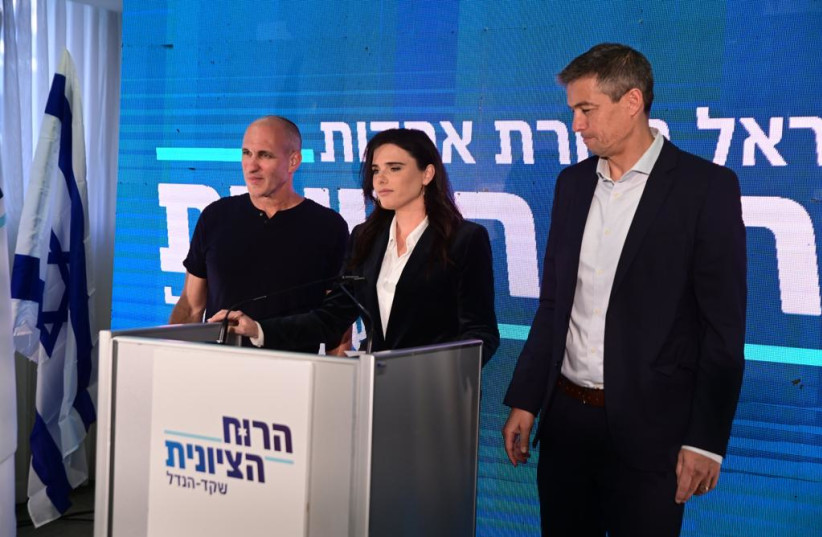The Zionist Spirit Party led by Interior Minister Ayelet Shaked and Communications Minister Yoaz Hendel expects to poll above the electoral threshold of 3.25% “within two weeks,” Shaked said on Radio 90 on Monday.
Since the party’s formation on July 27, it has failed to pass the electoral threshold in 18 of 23 opinion polls, according to TheMadad.com. It is, however, gaining steadily – from 2.6% and 2.8% last week to 3% this week.
The party hopes to reach six mandates in the upcoming election, Hendel told Walla News.
Passing the electoral threshold will serve as a tipping point, Shaked noted. She said the party will then enjoy an influx of voters who were hesitant to commit to it so as not to have their votes wasted.
The party has generated mostly negative headlines so far. On top of its failure to pass the threshold in the polls, there were stories nearly every week of another member leaving the party. First it was Deputy Religious Services Minister MK Matan Kahana, then MK Shirley Pinto, and on Friday, Deputy Minister in the Prime Minister’s Office MK Abir Kara.


The larger strategy
The party has kept a relatively low profile and has not yet held public events, other than the announcement it was bringing on former Religious Kibbutz Movement CEO Amitai Porat.
However, this is an intentional part of a larger strategy that has shown success in the past, according to a source in the party. The party spent hundreds of thousands of shekels last month in order to map out its campaign strategy, and only now is beginning to implement it, the source said.
Relatively small parties that peaked too early in the previous election ended up losing steam and finishing below their stated goals, the source added. He gave as an example Justice Minister Gideon Sa’ar’s New Hope Party, which at its onset was polling in double digits, but ended up receiving just six seats in the previous election.
On the other hand, parties that campaigned slowly and methodically were able to pick up steam as the election neared. Examples include Defense Minister Benny Gantz’s Blue and White Party, which was the surprise of the election with eight seats, and Labor – led by Transportation Minister Merav Michaeli – which hit a 1.4% low in the polls but ended up with seven seats.
Zionist Spirit is focused on one date only – November 1 – unlike other parties that are still quarreling over the makeup of their lists, mistakenly focusing their energy on the September 15 deadline to hand in lists, the source added.
The party’s “classic” voter would be someone who is right wing economically. On issues related to the Israeli-Palestinian conflict, they are most likely religious Zionist or traditional. And they don’t feel particularly strongly about whether opposition leader Benjamin Netanyahu is qualified to be prime minister, the source said.
These voters break down into sub-groups, he explained. The first group is voters known as the “soft Right,” who shy away from the aggressive tactics of the Likud and Religious Zionist Party but also do not want to vote for a party on the Center-Left. This group may have voted for New Hope but is less willing to do so after its merger with Gantz and the addition of former chief of staff Gadi Eisenkot, both or whom hold more conciliatory views on the Palestinians than Shaked.
A second group is made of right-wing ideologues who care more about policy than about personalities, and respect “doers” such as Shaked and Hendel for their abilities to implement right-wing ideologies in their respective government ministries. These voters have no problem with the style of Likud or the Religious Zionist Party, but prefer Shaked and Hendel precisely because they do more than talk.
The third group is made up of “strategic voters.” Although they might have preferred to vote for the National Unity Party, they are unwilling to do so because they have not become convinced that Gantz can form a government without some form of support from the Arab Joint List. Gantz pledged that he would not form a government based on the “extremes,” but if the Likud and the haredi parties refuse to join him, he would have no other option.
According to Hendel, Gantz was willing to accept support from the Joint List following the March 2020 election, but Hendel and ally MK Zvi Hauser refused. That eventually led Gantz to join Netanyahu in the “emergency COVID-19” government. Hendel can thus argue that he, unlike Gantz, never agreed to receive support from the Joint List and can be trusted on this matter.
Sitting on the Knesset fence
Many members of these three groups are currently sitting on the fence, and Zionist Spirit is confident it can bring them onboard, the source said.
The main message coming out of the Zionist Spirit campaign has been that it intends to act as an “axis party.” Since it is the only party not to commit either for or against Bibi, the next coalition will hinge on its decision. It will use this leverage to force a “unity government” that will include both the Likud and parties from the Center-Left.
This, seemingly, could be what is distancing voters – those in the anti-Bibi camp are afraid that Shaked will join him after the election, while those in the pro-Bibi camp believe she will join his opponents, as she did in the previous election.
The party, however, will attempt to convince the public that despite each side ruling out the other, they will end up agreeing to join each other, the source said. An example would be Gantz joining up with Netanyahu again. Even though the defense minister said he was “done with Netanyahu” and that he would not join the Likud leader in any form or under any constellation, Zionist Spirit believes he might yet break this promise.
Gantz negotiated with Netanyahu after the election was announced on June 20 in order to attempt to form a new government by dissolving the Knesset. Throughout the past year, he also refrained from resigning from the Knesset as part of the Norwegian Law so as to leave himself the option to support an alternate government, or at least to threaten to do so. This shows that unlike the others in the anti-Bibi camp, Gantz is not as keen on ruling out cooperation with the Likud if he receives enough in exchange, the source argued.
In any case, even if this argument fails and each bloc continues ruling out the other, there is reason to believe that the Zionist Spirit is not out of the game. However, it will need to pass the electoral threshold soon, before voters lose faith, the source concluded.
